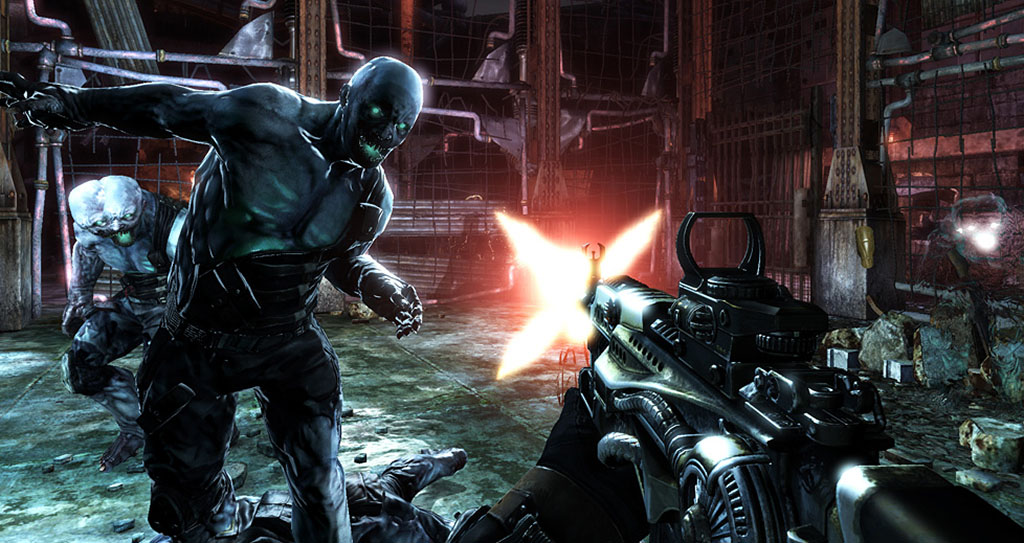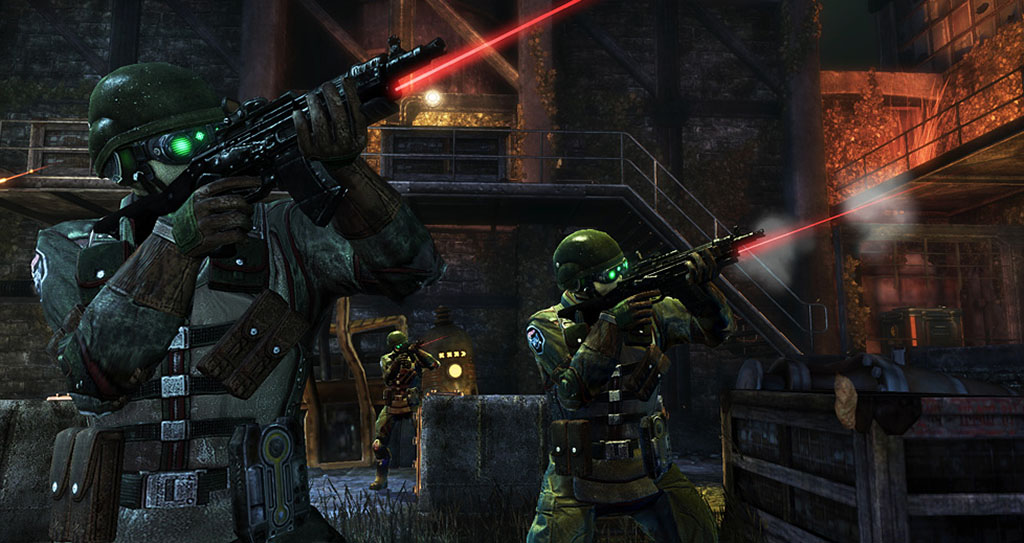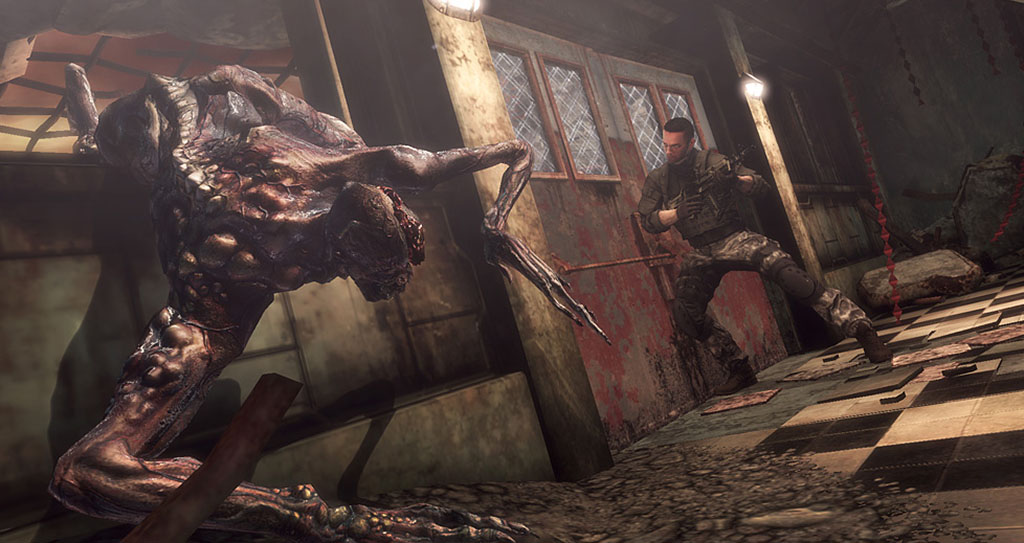Singularity: Equilibrium
Spoiler warning:This post reveals substantial portions of the plot, including the ending.
In the wake of nearly every popular cultural phenomenon arrives a flood of imitators. Their reasons for existing aren’t always obvious, however; some imitators are obvious cash-ins, yes, and others are little more than tributes to the original. But some retreads have higher aspirations—inspired by, but not direct copies of. Maybe it’s an attempt to tell the same basic story in a different way, or tweak parts of the formula to make it more appealing to a certain audience. Whatever the intent, these sorts of imitations aren’t always abject failures; sometimes you find a diamond in the rough.
At first glance, it’s hard to say if Singularity is one of those diamonds or not. Created by Raven Software, a developer with a long history of making games that have been somewhat overlooked or summarily dismissed, Singularity represents one of the company’s few original titles. The company is best known for repurposing id Software engines to create new games; Heretic and Hexen are Raven’s first and best-known successes. Later in life, Raven moved on to building direct sequels to id’s own games, including Quake 4 and the Wolfenstein revival. But even if Singularity is one of the few Raven games that doesn’t rely on someone else’s universe or characters, it still feels as though it’s taking its tricks from other people’s source material—in this case, Bioshock.
Bioshock’s formula is itself nothing new (obligatory System Shock 2 reference here), but it brought that style of gameplay to a much bigger audience, thanks in part to some streamlining. But the lion’s share of the credit has to go to the world of Rapture and all the intricate little details that help realize it—there are so many elements large and small that build the world, whether it’s the moody period music or the little setpieces, like the first time you see a Houdini Splicer disappear in a shower of rose petals. You already know where this is going: Singularity gets the details wrong. A lot. If it hadn’t, it probably would’ve sold a lot better.
Bioshock’s main problem was that it asked intriguing questions about your role in Rapture, but then answers them unsatisfactorily; Singularity’s time-travel plot never bothers, and for that it is immediately a less compelling game. But it feels like Raven was never really trying to build the next Bioshock; rather, it was creating a pulpier, less complicated version with some unique ideas. It’s not Inception remaking the heist movie; it’s more like Equilibrium riding the coattails of The Matrix. From the very first moments, you get the sense that something in the storytelling isn’t quite right; when you walk into the arrival lounge on Katorga-12, the Russian outpost you’ve been sent to investigate, there’s an orientation movie on the filmstrip. But it’s done in an oddly cheery animation style, like some kind of Saturday morning cartoon, Russian-style. This worked great in games like Fallout and Bioshock because of the contrast between the bucolic cartoon and the harsh, unforgiving reality. It helped that Bioshock (and Fallout at times) had an exaggerated, vaguely carnivalesque atmosphere. Singularity has none of this; instead it drops you into a proto-Cold War Russian outpost where things go horribly wrong. The cartoon feels out of place.
The audio clips don’t work as well as in Bioshock, either; you have to stand by the tape recorder in order to hear the whole message, which tends to kill your momentum early in the game. You never get to know any specific characters like you do in Bioshock; at best, a few recordings will link together to create a vignette about the desperate escape attempts of a few miners, or a couple split apart after one attempts to find rescue from their underwater hideout. Early recordings don’t even go this far, instead giving us such memorable classics as “child trapped in a bathroom” or “man who is scared of monsters” or even “woman who is also scared of monsters.” There’s also a troubling aspect to the recordings that you never stop to think about in Bioshock (but maybe start to wonder about a bit in Bioshock 2): why on earth does everyone have an audio diary? Why did a little kid drag a reel-to-reel recorder with them into the school bathroom when the monsters broke in and started killing everyone? When your leg is crippled and you can barely swim, would you think to bring a recorder with you? It strains the limit of credulity.
So Singularity doesn’t always manage to suspend your disbelief. Sometimes it doesn’t even try, like when it mentions that only a few people realize that the timeline is changing, but then completely ignores why that should be the case. It makes a little bit of sense for Renko, the protagonist, to remember everything; he is, after all, wearing a magical time-bending device. But what about Barisov, the “good” scientist who’s trying to repair the timeline? How is it that even when you drastically alter the course of history on Katorga-12, he still somehow remembers he’s supposed to help you destroy the Singularity? That’s the problem with time travel stories—too many paradoxes, not enough narrative to untangle it all.
But if none of this bothers you enough to stop you playing about halfway through, you’ll probably enjoy the ride despite the logical inconsistencies. Singularity is very much the science-fiction TV-movie version of Bioshock, but that’s not necessarily a bad thing. The gunplay is simple but effective, and the tools at your disposal are sometimes awesomely powerful—take the Seeker, a rifle that shoots bullets you can control thanks to your time-slowing powers. Or the secondary fire of the grenade launcher, which gives you pilotable mines you can roll straight into your enemies. Granted, some of these tricks are pulled straight from other games. You do a lot of pulling barrels towards you with Telekinesis—er, I mean, gravity gun—er, whatever—and firing them at soldiers to freeze or burn them. But they’re not immediately less fun for being derivative.
In a way, Singularity is a fitting historical checkpoint for Raven, who has since seen cutbacks and is now positioned as a joint developer on Call of Duty material for Activision. As its potential last stab at an original franchise, Singularity is at once predictable and yet surprising in how entertaining it can be—a sentiment you could attach to a lot of Raven games, it seems. I can’t decide whether it’s sad that Raven is still making good-but-not-great games over a decade later, or if it’s laudable that they were able to maintain that level of quality on an entirely new property of their own design.
[this originally appears on Wesley’s tumblr.]







[…] This post was mentioned on Twitter by Doug Groves, rgbFilter. rgbFilter said: Singularity: Equilibrium: Spoiler warning:This post reveals substantial portions of the plot, including the endi… http://bit.ly/e0EjnX […]
578639 361997you got a very excellent web site, Sword lily I discovered it by means of yahoo. 917412
494728 319562Hi, have you ever before asked yourself to write about Nintendo or PSP? 290264
879876 400683Yeah bookmaking this wasnt a speculative decision outstanding post! . 769523